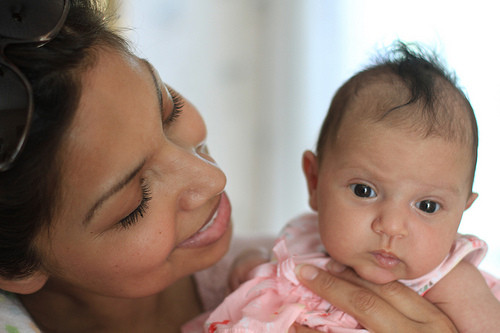All parents coo and make silly baby talk to their infant and baby. Now, a new study as reported by NeuroNet Learning found that talking to infants can boost their ability to learn new words and facilitate rapid vocabulary growth. The study, originally reported in Psychological Science, found that that the months during infancy are equally important in early language growth as prenatal experiences that affect babies’ speech processing and language development.
Environment plays a large part in young child language development. Children from socioeconomically depressed homes tend to be at more of a disadvantage than their more advantaged peers in language and reading abilities by the time they enter kindergarten. Parents’ socioeconomic status is strongly related to a child’s variation in language and other cognitive abilities and those from lower socioeconomic groups are often behind in language development.
Children learn language by listening to language. The best way is through direct communication with real people, not through television or video exposure, Children who are read to by parents and caregivers, and who are spoken with directly can help remedy this achievement gap. These activities of normal living will create opportunities for children to interpret language and learn new words.
To test this, researchers collected extensive recordings of infants’ interactions with family members by observing them at home when the child was 19 months old. When the children reached the age of 24 months, parents completed a vocabulary questionnaire consisting of questions regarding the number of words children understood and spoke.
A “looking-while-listening” task was also conducted at 24 months, in which infants were presented with pairs of images (e.g., a dog and a baby) while listening to sentences naming one of the pictures. Children were tested on words that are familiar to most children in that particular age range.
Infants’ speech processing abilities were also measured by calculating the proportion of time an infant spent fixated on the target picture out of the total time spent looking at either the target or distracter picture.
The results showed that infants whose parents spoke to them using a richer vocabulary were able to quickly and accurately identify the correct target word. These same infants also demonstrated greater language abilities. So, the more parents talk to their baby, the faster their baby may acquire speech and language skills.
Here are a few suggestions form WebMD on how parents can foster infant development through communication:
Look at your baby as he or she laughs or babbles, rather than looking away, or talking with someone else.
Attempt to decode your infant’s nonverbal communication, such as facial expressions, babbling sounds, or gurgling.
Have back-and-forth conversations (even if your baby is just babbling) to teach your baby the give-and-take of adult conversation.
Use gestures around your baby, as this is a form of communication.
Be patient with your baby and do your best to respond, even when you don’t understand what your baby is trying to say.
Smile often at your baby.








